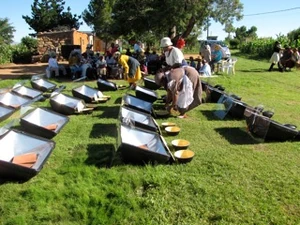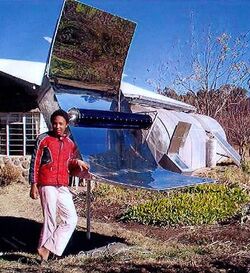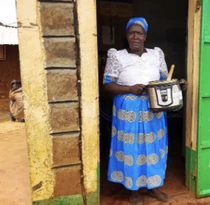Tom Sponheim (talk | contribs) (Added history) |
Tom Sponheim (talk | contribs) mNo edit summary Tag: sourceedit |
||
| (35 intermediate revisions by 6 users not shown) | |||
| Line 1: | Line 1: | ||
| + | {{GoogleTranslateLinks}} |
||
| − | ===News and Recent Developments=== |
||
| + | {{Updated|7|3|15}} |
||
| + | <table cellspacing="2"> |
||
| + | <tr> |
||
| + | <td valign="top" width="45%">__TOC__</td> |
||
| + | <td valign="top" width="55%" style="padding:9px;"> |
||
| + | [[File:Bethel Business and Community Development Centre|none|428px]] |
||
| + | The [[Bethel Business and Community Development Centre]] has built a prototype [[parabolic trough]] system that he is using to operate a steady cottage bread and pastry [[baking business]]. The device can bake 25-40 kilogram loaves (depending on the season) in a day (and even a bit more on a perfect day). It also does pastries beautifully. The solar bread baker works so well, that he has invested in a 20-liter dough mixer, which also operates off his house’s PV system. |
||
| + | </table> |
||
| + | ==Events== |
||
| + | {{CalendarAndPastEvents}} |
||
| + | =={{HeadingNews}}== |
||
| − | ===The History of Solar Cooking in Lesotho=== |
||
| + | [[File:IMG_2257.jpeg|thumb|300px|The Sunstoves are ready to begin baking bread.]] |
||
| ⚫ | |||
| + | |||
| + | *'''February 2014:''' [[Margaret Bennett]] reports on a [[SunStove]] training that took place earlier this month in [[Lesotho]]. The workshop was run by two ladies from Quebec, [[Canada]], and funded by the Raging Grannies of Vancouver. Twenty-five sunstoves were set out with tiles to preheat with soupa dishes placed in the sun on the group to warm the water/oil mixture for the Bohobe (bread) recipe. While the bread baked, we talked - repeating the lessons of the week and answering questions. Everyone is keen to dry fruit in the sunstove & we are excited to hear the results. Keke informed us that fruit buyers in Mohales Hoek pay 50 rand a kilo for dried fruit, so this could be an income-generator for some of these grandparents and children. Much thanks to Carol and Christine, trainers, solar cooks, and carpenters. |
||
| + | |||
| + | [[Image:Parabolic_trough_Ivan_Yaholnitsky_2008.JPG|right|250px|thumb|Parabolic trough cooker bakes 10 loaves of bread at one time.]] |
||
| + | *'''April 2008:''' [[Ivan Yaholnitsky]] has built a proto-type parabolic trough system that he is using to operate a steady cottage bread and pastry baking business. The device can bake 25-40, 1000g loaves (depending on the season) in a day (and even a bit more on a perfect day). It also does pastries beautifully. The solar bread baker works so well, that he has invested in a 20 liter dough mixer, which also operates off his house’s PV system. |
||
| + | |||
| + | =={{HeadingHistory}}== |
||
| ⚫ | |||
of the Eighth Biennial Congress of the International Solar Energy Society, a group of |
of the Eighth Biennial Congress of the International Solar Energy Society, a group of |
||
[[South Africa]]ns attempted to introduce solar cooking in the mountains of Lesotho. The |
[[South Africa]]ns attempted to introduce solar cooking in the mountains of Lesotho. The |
||
project was not a success from Eberhard's perspective, confirmed by two others on return |
project was not a success from Eberhard's perspective, confirmed by two others on return |
||
| − | from a |
+ | from a Peace Corps assignment and academic work in the country. Their analysis of |
reasons, cast in terms of Rogers' 1983 theory on the diffusion of innovation, concludes |
reasons, cast in terms of Rogers' 1983 theory on the diffusion of innovation, concludes |
||
that an innovation basically cannot be introduced by foreigners. They then proceed to |
that an innovation basically cannot be introduced by foreigners. They then proceed to |
||
| Line 17: | Line 35: | ||
The current center for solar cooking in this small nation is located in a multipurpose |
The current center for solar cooking in this small nation is located in a multipurpose |
||
| − | educational facility, the [[Bethel Business and Community Development |
+ | educational facility, the [[Bethel Business and Community Development Centre]], |
located in Moorosi, Lethotha. The Centre, which began in 1998, provides adult education |
located in Moorosi, Lethotha. The Centre, which began in 1998, provides adult education |
||
of many applied types, attempting to inculcate practical skills and teamwork in its young |
of many applied types, attempting to inculcate practical skills and teamwork in its young |
||
| Line 28: | Line 46: | ||
students. |
students. |
||
| − | The unit that focuses on solar technology is called |
+ | The unit that focuses on solar technology is called Solar Soft. Representatives of |
the group were present at the world meeting in Kimberley, [[South Africa]]. The design they |
the group were present at the world meeting in Kimberley, [[South Africa]]. The design they |
||
were using was a box cooker mounted on a heavy pipe set into a ground base which |
were using was a box cooker mounted on a heavy pipe set into a ground base which |
||
| Line 40: | Line 58: | ||
renewable modes of operating, thereby providing students with multiple and integrated |
renewable modes of operating, thereby providing students with multiple and integrated |
||
lessons for their later life. |
lessons for their later life. |
||
| + | {{ArchivedPagesForHistory}} |
||
| − | |||
| + | =={{HeadingClimateCulture}}== |
||
| − | ===Climate, Culture, and Special Considerations=== |
||
| + | *{{WikipediaClimate|https://en.wikipedia.org/wiki/Geography_of_Lesotho#Climate}} |
||
*[[Solar cooker dissemination and cultural variables]] |
*[[Solar cooker dissemination and cultural variables]] |
||
| − | == |
+ | ==Resources== |
| − | + | ===Reports=== |
|
*'''November 2003:''' [http://www.she-inc.org/art.php?id=27 Report on Peace Corps Initiated Solar Oven Project in Lesotho, Southern Africa] |
*'''November 2003:''' [http://www.she-inc.org/art.php?id=27 Report on Peace Corps Initiated Solar Oven Project in Lesotho, Southern Africa] |
||
| − | + | ===Articles in the media=== |
|
| + | *{{NewJan16}}'''January 2016:''' [http://gulfislandsdriftwood.com/community/solar-cookers-on-their-way/#.Vo2f3hHEh0s Solar cookers on their way] - ''Gulf Islands Driftwood'' |
||
| − | ====Web pages==== |
||
| − | |||
| ⚫ | |||
| − | ====NGOs based in-country==== |
||
| − | ====NGOs based abroad but working in-country==== |
||
| − | ====Individuals==== |
||
| − | *A complete list of [[Solar Cookers International]]'s solar cooking contacts is available in the [http://solarcooking.org/directory.htm#Lesotho International Directory of Solar Cooking Promotors] |
||
| − | |||
| − | ====Manufacturers and Vendors==== |
||
| − | |||
| − | ===See Also=== |
||
| − | *[[:Category:{{PAGENAME}}|Click here for the complete list of Solar Cooking Wiki articles related to {{PAGENAME}}]] |
||
| ⚫ | |||
| + | * [http://solarcooks-plus.livejournal.com Solarcooks Plus] |
||
| + | {{CountryContacts}} |
||
| ⚫ | |||
| − | [[Category:Countries |
+ | [[Category:Countries]] |
| ⚫ | |||
| + | [[Category:Southern Africa]] |
||
| + | [[Category:Africa]] |
||
Revision as of 18:43, 7 February 2016
|
Last edited: 3 July 2015
|
|
The Bethel Business and Community Development Centre has built a prototype parabolic trough system that he is using to operate a steady cottage bread and pastry baking business. The device can bake 25-40 kilogram loaves (depending on the season) in a day (and even a bit more on a perfect day). It also does pastries beautifully. The solar bread baker works so well, that he has invested in a 20-liter dough mixer, which also operates off his house’s PV system. |
Events
Featured international events
- 4-6 June 2024 (Bridgetown, Barbados): Sustainable Energy for All Global Forum - The event will be co-hosted by Sustainable Energy for All (SEforALL) and the government of Barbados. It is a platform for government, business and finance leaders, entrepreneurs, and youth and community representatives from around the world to come together to broker new partnerships, spur new investment, and address challenges at the nexus of energy, climate, and development. More information...
Online events
- NEW: Thursday, 18 April 2024 (2:30pm-3:15pm EDT), (Washington, D.C., USA): ESMAP Spring Meetings Knowledge Café: Clean Cooking at the Heart of Energy Access - Join ESMAP for this exciting knowledge-sharing opportunity, which will showcase the role of clean cooking as a key part of energy access and energy transition. Presentations by René van Hell, Director of Inclusive Growth, Ministry of Foreign Affair, Netherlands, Dr. Kandeh Yumkella Chairman, Presidential Initiative on Climate, Renewable Energy and Food Security, Sierra Leone, and Chandrasekar Govindarajalu, Practice Manager, ESMAP, World Bank. In-person attendance at World Bank Atrium, MC Front Lobby is for Spring Meetings registrants only. However, you can watch the event online
Requests for proposal
- Decentralized Renewable Energy Solutions utilizing Solar and Bio-Energy - Sustainable Energy Technologies and Assessments of ScienceDirect, is requesting guest-author submissions. The special issue, VSI: DRES is devoted to publishing research articles reporting the innovative designs and design interventions in solar thermal and bio-energy for decentralized energy systems (DES). It includes i) new and novel designs of prototype or commercial devices and technologies, their development, modeling and simulations and experimental validation; ii) innovations for processes, techniques, utilization, and applications; iii) novel use of materials for improving efficiency, performance, techno-economic feasibility, and sustainability and iv) research findings addressing the socio-economic, health and safety impacts, and life cycle assessments leading to proposing novel devices for DES. The Deadline for submission is 31 July 2024. More submittal information...
- See also: Global Calendar of Events and past events in Lesotho
News

The Sunstoves are ready to begin baking bread.
- February 2014: Margaret Bennett reports on a SunStove training that took place earlier this month in Lesotho. The workshop was run by two ladies from Quebec, Canada, and funded by the Raging Grannies of Vancouver. Twenty-five sunstoves were set out with tiles to preheat with soupa dishes placed in the sun on the group to warm the water/oil mixture for the Bohobe (bread) recipe. While the bread baked, we talked - repeating the lessons of the week and answering questions. Everyone is keen to dry fruit in the sunstove & we are excited to hear the results. Keke informed us that fruit buyers in Mohales Hoek pay 50 rand a kilo for dried fruit, so this could be an income-generator for some of these grandparents and children. Much thanks to Carol and Christine, trainers, solar cooks, and carpenters.

Parabolic trough cooker bakes 10 loaves of bread at one time.
- April 2008: Ivan Yaholnitsky has built a proto-type parabolic trough system that he is using to operate a steady cottage bread and pastry baking business. The device can bake 25-40, 1000g loaves (depending on the season) in a day (and even a bit more on a perfect day). It also does pastries beautifully. The solar bread baker works so well, that he has invested in a 20 liter dough mixer, which also operates off his house’s PV system.
History
Around two decades ago, as reported by A. A. Eberhard in the 1994 Proceedings of the Eighth Biennial Congress of the International Solar Energy Society, a group of South Africans attempted to introduce solar cooking in the mountains of Lesotho. The project was not a success from Eberhard's perspective, confirmed by two others on return from a Peace Corps assignment and academic work in the country. Their analysis of reasons, cast in terms of Rogers' 1983 theory on the diffusion of innovation, concludes that an innovation basically cannot be introduced by foreigners. They then proceed to discuss successful introduction of devices by others with foreign sounding names like Yaholnitsky and Scott, that have in fact, been more successful. (Scott, though not a Basotho, was born there.) Their approaches to introducing solar cooking were very practical, such as teaching women how to cook the basic staple of the country, and using local people as aides and trainers. Perhaps all of this is a precursor to the current situation in Lesotho.
The current center for solar cooking in this small nation is located in a multipurpose educational facility, the Bethel Business and Community Development Centre, located in Moorosi, Lethotha. The Centre, which began in 1998, provides adult education of many applied types, attempting to inculcate practical skills and teamwork in its young adult student body. The center demonstrates by its own use topics such as water resource development and utilization, improvement of rural infrastructure, enhancement of village design, solar energy utilization, and environmental regeneration. Some of the courses of study are extended, giving students professional training and skills; others are short courses for refreshing already learned skills and exposure to new ideas in the various fields. The campus included residential quarters for both the full time and the short-term students.
The unit that focuses on solar technology is called Solar Soft. Representatives of the group were present at the world meeting in Kimberley, South Africa. The design they were using was a box cooker mounted on a heavy pipe set into a ground base which allowed it to turned to follow the sun. (SCI personnel made certain they had a CooKit to take home and experiment with.) A small but steady demand for cookers, which are made by craftsmen at the Center, has been generated. Their strategy has been to target a better-educated, middle class audience, touting environmental arguments rather than fuel savings. They have demonstrated that cookers can be sold to this audience. Students at the college prepare lunches every day of the school week using solar cookers. A strength of the program is the situating of solar cooking firmly in the range of other solar and renewable modes of operating, thereby providing students with multiple and integrated lessons for their later life.
- Main article: History of solar cooking
Archived articles
Climate and culture
Resources
Reports
Articles in the media
- January 2016: Solar cookers on their way - Gulf Islands Driftwood
Blogs
Contacts
The entities listed below are either based in Lesotho, or have established solar cooking projects there:
SCI Associates
- Main article: Solar Cookers International Association



